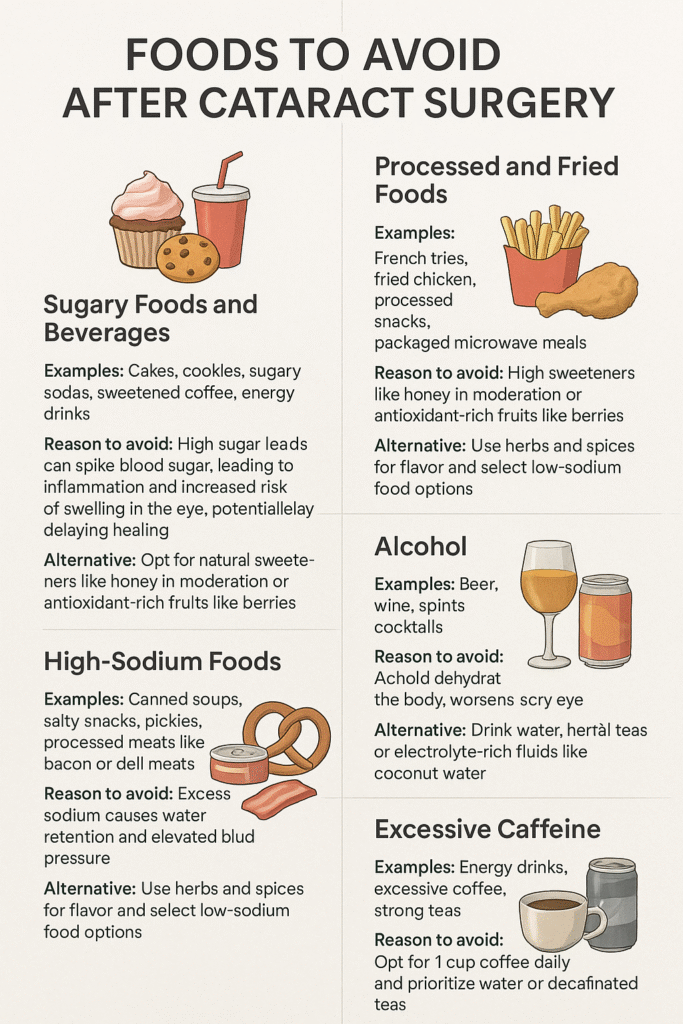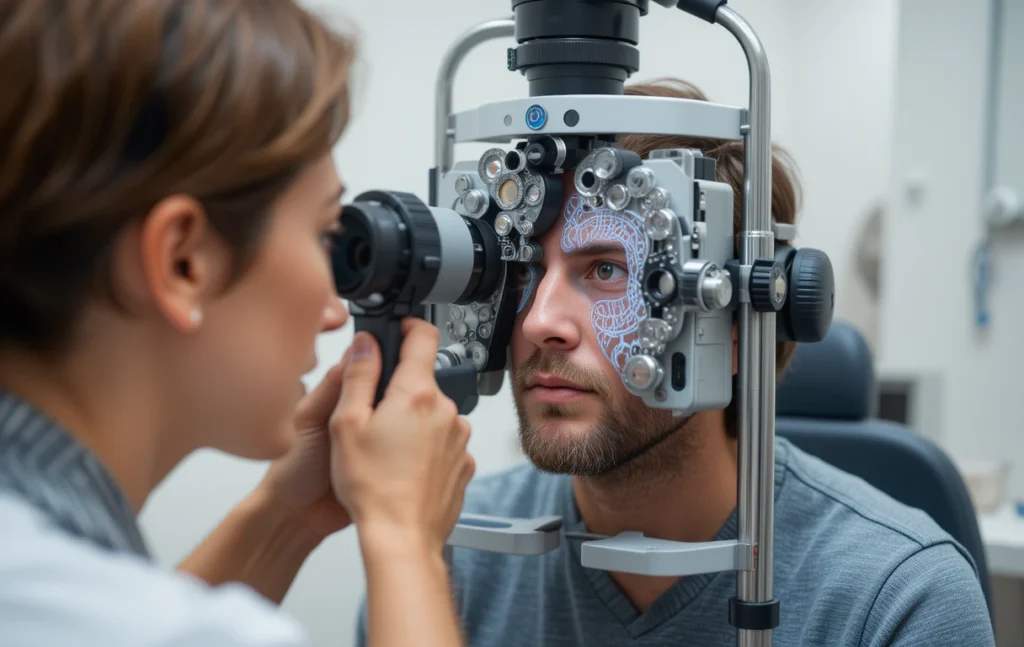
Cataract surgery is a common procedure to restore vision by removing a clouded lens and replacing it with an artificial one. While the surgery is generally safe, proper post-operative care, including dietary choices, is crucial for a smooth recovery. Certain foods can increase inflammation, delay healing, or cause complications. This article explores foods to avoid after cataract surgery, their impact on recovery, and practical tips for maintaining eye health. Whether you’re a patient, caregiver, or health-conscious individual, understanding these dietary restrictions can support optimal healing.
Significance of Diet in Cataract Surgery Recovery
Diet plays a vital role in post-cataract surgery recovery by influencing inflammation, hydration, and tissue repair. Consuming the wrong foods can exacerbate swelling, increase intraocular pressure, or strain the digestive system, potentially affecting the eyes. Avoiding problematic foods helps reduce complications like infection or delayed healing, ensuring the surgical outcome is successful. This section outlines why dietary caution is essential and how it supports long-term eye health.
Why Diet Matters Post-Surgery
- Reducing Inflammation: Foods high in sugar or unhealthy fats can trigger inflammation, which may slow healing.
- Maintaining Hydration: Proper hydration supports eye lubrication and prevents dry eyes, a common post-surgery issue.
- Supporting Healing: Nutrient-rich diets promote tissue repair, while certain foods can hinder this process.
Foods to Avoid After Cataract Surgery
Certain foods should be avoided to minimize complications and promote recovery. Below is a detailed list of foods to steer clear of and the reasons why.

1. Sugary Foods and Beverages
High-sugar foods like candies, sodas, and desserts can spike blood sugar levels, leading to inflammation. This can increase the risk of swelling in the eye, potentially affecting surgical outcomes.
- Examples: Cakes, cookies, sugary sodas, sweetened coffee, and energy drinks.
- Why Avoid: Elevated blood sugar may impair immune response and delay healing.
- Alternative: Opt for natural sweeteners like honey in moderation or fruits like berries for sweetness.
2. Processed and Fried Foods
Fried or highly processed foods, such as fast food, chips, and frozen meals, are high in trans fats and sodium. These can contribute to inflammation and increase blood pressure, which may strain delicate eye tissues.
- Examples: French fries, fried chicken, processed snacks, and packaged microwave meals.
- Why Avoid: Trans fats promote systemic inflammation, and high sodium can elevate intraocular pressure.
- Alternative: Choose baked or steamed foods like grilled vegetables or lean proteins.
3. High-Sodium Foods
Excess sodium can lead to water retention and increased blood pressure, both of which can negatively affect eye health post-surgery. High-sodium diets may also exacerbate dry eyes.
- Examples: Canned soups, salty snacks, pickles, and processed meats like bacon or deli meats.
- Why Avoid: Sodium-induced fluid retention can increase pressure in the eyes, risking complications.
- Alternative: Use herbs and spices for flavor and choose low-sodium options.
4. Alcohol
Alcohol dehydrates the body, which can worsen dry eye symptoms and slow healing. It may also interact with post-surgery medications, such as painkillers or antibiotics.
- Examples: Beer, wine, spirits, and cocktails.
- Why Avoid: Dehydration and potential drug interactions can complicate recovery.
- Alternative: Drink water, herbal teas, or electrolyte-rich fluids like coconut water.
5. Spicy Foods
Spicy foods can irritate the digestive system and, in some cases, cause discomfort that indirectly affects recovery. They may also trigger watery eyes, which can be problematic during healing.
- Examples: Hot sauces, chili peppers, and heavily spiced dishes.
- Why Avoid: Digestive irritation or excessive tearing can disrupt post-surgery care.
- Alternative: Opt for mild flavors like herbs or light seasonings.
6. Caffeine in Excess
While moderate caffeine is generally safe, excessive consumption can lead to dehydration, which may worsen dry eyes or affect sleep quality, both critical for recovery.
- Examples: Energy drinks, excessive coffee, or strong teas.
- Why Avoid: Dehydration and disrupted sleep can slow the healing process.
- Alternative: Limit caffeine to one cup daily and prioritize water or decaffeinated teas.
Practical Tips for a Healthy Post-Surgery Diet
To support recovery, focus on a balanced diet rich in nutrients that promote healing. Here are actionable tips:
- Prioritize Anti-Inflammatory Foods: Include omega-3-rich foods like salmon, walnuts, and flaxseeds to reduce inflammation.
- Stay Hydrated: Drink at least 8-10 glasses of water daily to support eye lubrication and overall health.
- Eat Nutrient-Dense Foods: Incorporate leafy greens, citrus fruits, and lean proteins to provide vitamins A, C, and E, which are essential for eye health.
- Consult Your Doctor: Always check with your healthcare provider for personalized dietary advice, especially if you have conditions like diabetes.
Learn more about managing eye conditions that could affect recovery, such as glaucoma, through expert insights.
Emerging Trends in Post-Cataract Surgery Nutrition
Recent trends in eye health emphasize personalized nutrition and anti-inflammatory diets. Advances in nutrigenomics suggest that tailored diets based on genetic profiles may optimize recovery. Additionally, plant-based diets rich in antioxidants are gaining popularity for their role in reducing oxidative stress, which can benefit eye health. Staying informed about these trends can help patients make proactive dietary choices.
- Personalized Nutrition: Emerging research highlights the role of individualized diets in improving surgical outcomes.
- Plant-Based Diets: Vegan or vegetarian diets with high antioxidant content are increasingly recommended.
- Supplements: Omega-3 and vitamin supplements may be advised, but only under medical supervision.
Community Impact and Practical Applications
Dietary choices after cataract surgery not only benefit the individual but also inspire healthier habits in families and communities. Caregivers can play a role by preparing nutrient-rich meals, while community health programs can educate patients on post-surgery nutrition. By adopting these practices, individuals contribute to a broader culture of wellness and proactive health management.
Explore actionable solutions for common eye issues like pink eye to complement your recovery journey.
FAQ: Common Questions About Diet After Cataract Surgery
Q: Why should I avoid sugary foods after cataract surgery?
A: Sugary foods can increase inflammation and blood sugar levels, which may delay healing or cause swelling in the eye.
Q: Can I drink coffee after cataract surgery?
A: Moderate coffee consumption is usually safe, but excessive caffeine can cause dehydration, worsening dry eyes. Limit to one cup daily.
Q: Are spicy foods harmful after cataract surgery?
A: Spicy foods may irritate the digestive system or cause watery eyes, which can interfere with recovery. Opt for milder flavors.
Q: How does hydration affect recovery from cataract surgery?
A: Proper hydration supports eye lubrication, reduces dry eye symptoms, and promotes overall healing. Aim for 8-10 glasses of water daily.
Q: Can I consume alcohol after cataract surgery?
A: Alcohol should be avoided as it dehydrates the body and may interact with medications, slowing recovery.
Q: What foods should I eat to support recovery?
A: Focus on anti-inflammatory foods like leafy greens, fatty fish, and fruits rich in vitamins A, C, and E.
Q: How long should I follow dietary restrictions after surgery?
A: Follow your doctor’s advice, but most restrictions apply for 2-4 weeks or until your eye fully heals.
Looking Ahead: Sustaining Eye Health Post-Recovery
Avoiding certain foods after cataract surgery is essential for a smooth and speedy recovery. By steering clear of sugary, processed, high-sodium, spicy, and dehydrating foods like alcohol and excessive caffeine, patients can reduce complications and support healing. Incorporating nutrient-dense, anti-inflammatory foods and staying hydrated further enhances recovery outcomes. For personalized advice, consult your ophthalmologist or a nutritionist. If considering future eye procedures like LASIK, understanding dietary impacts can be beneficial. By making informed choices, you can protect your vision and promote long-term eye health.
Disclaimer: This article is for informational purposes only and does not constitute medical advice. Always consult a healthcare professional or ophthalmologist before making dietary changes or addressing eye health concerns post-surgery.


